Women’s health physiotherapy includes services during pregnancy or prenatal physiotherapy, postnatal rehabilitation, incontinence, and pelvic floor sessions for many other problems… give a look to all of them:
- Prenatal Physiotherapy
- Postnatal physiotherapy
- Chronic pelvic pain
- Incontinence
- Urinary Urgency
- Intimacy problems
- Pelvic organ prolapse
- Nocturia
- Menstrual Pain
- Menopause
- Coloproctology
Prenatal Physiotherapy
GET READY FOR THE BIG DAY!
Ideally, every pregnant woman should book two appointments. The first one to check how is the status of the pelvic floor. The second one is to learn how to do the perineal massage and how to push during birth.

You can book an appointment at anytime if you feel pain or leaks.
The most important part of prenatal physiotherapy is prevention. Even if you don’t have any symptom as back pain or incontinence you can check your pelvic floor anytime after week 12. Once the pregnancy progress, you should do the perineal massage and learn how to push. To do this is better to wait until week 32, but it’s never too late if you passed this date.
Of course, depending on each patient we will tailor a specific program. However, after years of working with pregnant women I always recommend at least :
- check your pelvic floor,
- learn how to do the perineal massage,
- learn how to push.
Click here to start learning step-by-step how to do the perineal massage on your own!
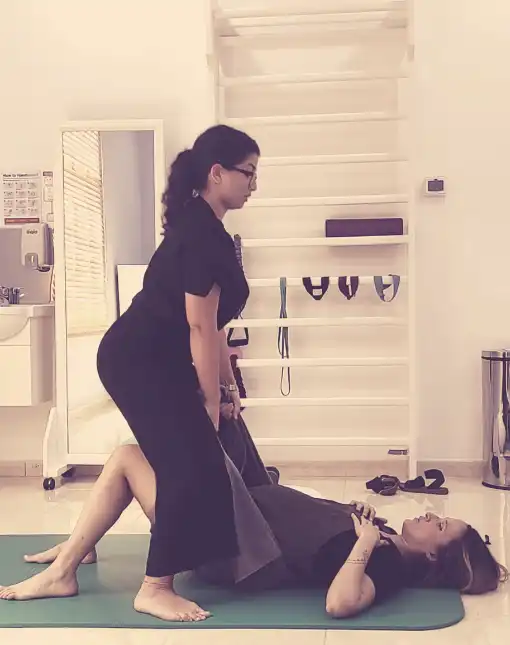
Checking your pelvic floor around week 12 of pregnancy is highly recommended. If you suffer from urinary incontinence, constipation, coxis pain or back pain pelvic floor sessions are a MUST. We will solve this problem together before the pregnancy advances. The objective is that you enjoy this period of life without any discomfort.
Remember that back pain is common during pregnancy but it’s not normal to be constantly in pain. I highly recommend not waiting till the postpartum to visit a specialist. Back pain will affect your birth and also your recovery during the postpartum.
If you don’t have any symptoms (or maybe life just happened and you deal with them by your own) book an appointment around weeks 32-35. In this session, you will learn how to prepare your perineum for birth. From weeks 32-35, we will use the perineal massage and practice the pushes. Anyways, is never too late to start.
Some women prefer to do more than one session to be more relaxed and feel more confident. Other women feel ready just with one session… Some of my patients came to practice even if it’s their baby number 4! This session will help you to reconnect with your body and every person has a different rhythm.
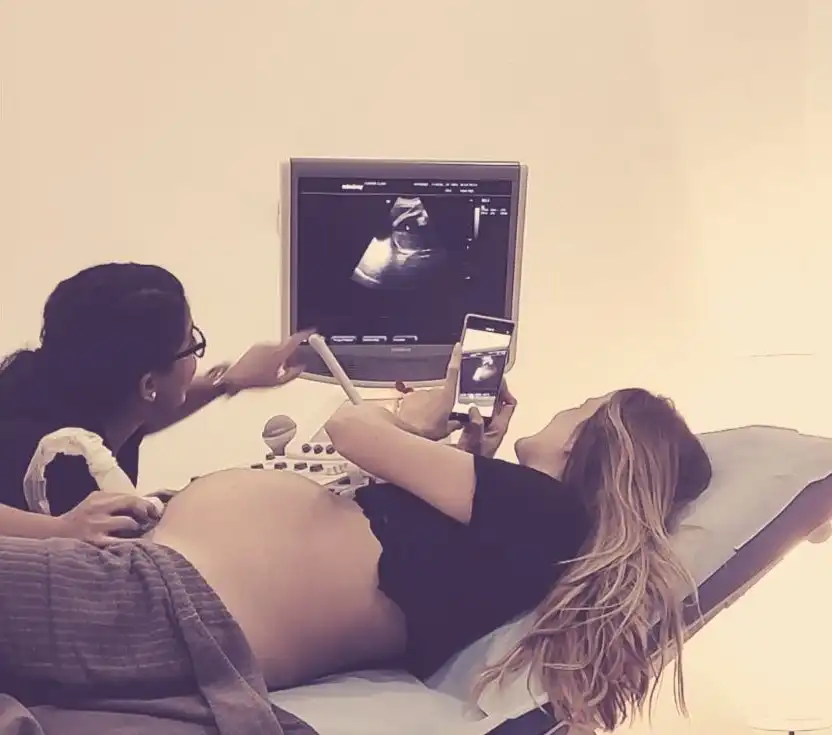
Remember that during pregnancy is common BUT NOT NORMAL to feel symptoms of pain and heaviness. A physiotherapist specialized in the pelvic floor can help you with all these symptoms. During the sessions, you will receive manual therapy, therapeutic exercises and lymphatic drainage.
Prenatal physiotherapy is one of the most common areas of women’s health. Be sure of choosing the correct professional for this period of your life. Feel free to contact anytime!
Postnatal physiotherapy
I like to consider the postnatal period from the minute a baby is born till the mother herself feels fully recovered!
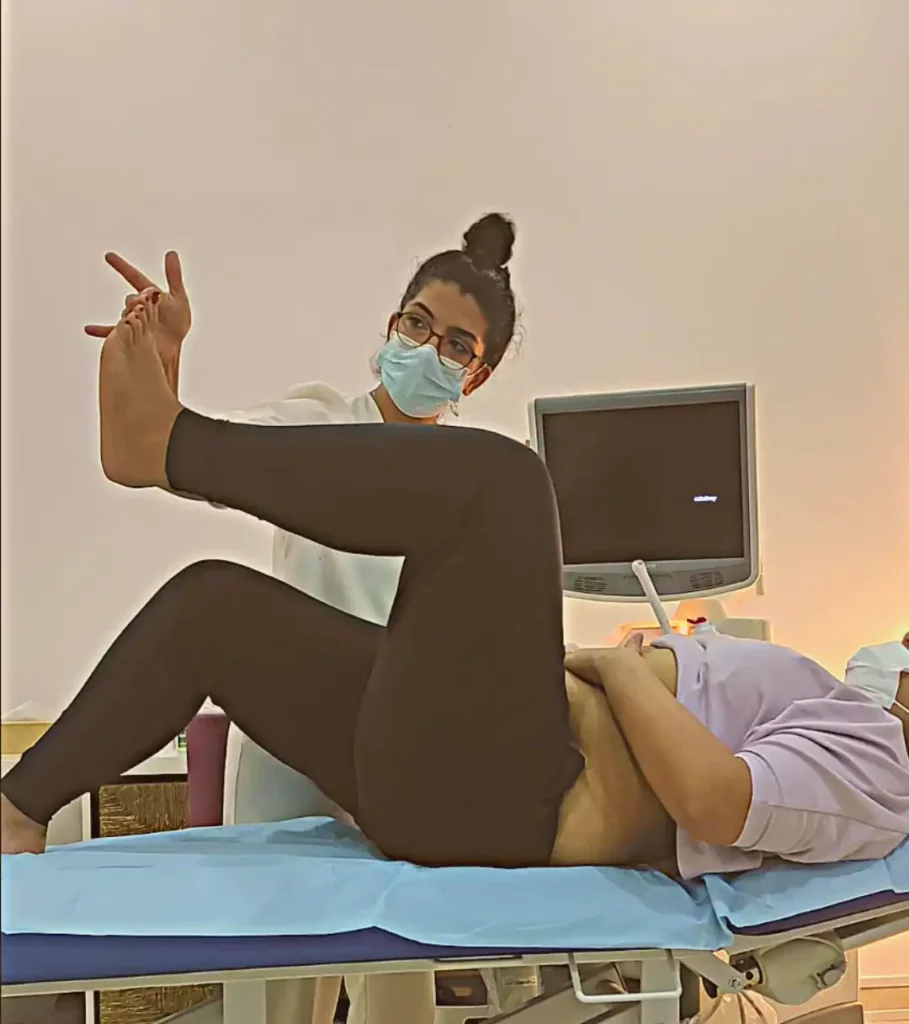
Ideally, you should book a consultation with a specialist in pelvic floor 40 days after you give birth. You can book once your gynaecologist discharges you.
For some women, this period of recovery lasts up to 6 months. Instead, other women feel even better than before getting pregnant just 6 weeks after giving birth. Other women do their postnatal check 10 years after they had their first kid. As you know… life can get busy after becoming a mum! Every woman has her own postpartum journey.
The objective of this physiotherapy session is to check how are your diastasis and core behaving. As you know, one of the main components of the core is the pelvic floor. That’s why is needed to check the proper function of the core to start exercising.
With these sessions, you will learn how to work out properly, and how to solve symptoms such as pelvic pain, incontinence, pain during intercourse or back pain.
Remember that you need to do this check-up even after a c-section.
You can always book an appointment sooner if you feel that something is not doing as it should or if you feel great and you want to start to exercise. Many women book the check-up after years of giving birth… this is fine too!
Click here to read about the recovery of the abdomen in the postpartum!
Other Women’s health issues:
The rehabilitation of the pelvic floor is well known during the pre and postnatal period. However, there are a lot of other situations in which you need to check what’s happening in the lower part of your pelvis.
Read this article to know when to check your pelvic floor even if you never gave birth.
Chronic pelvic pain
You might have found this diagnosis after a while of suffering from pain/heaviness/burning around your pelvis.
Pelvic floor rehabilitation can help you to deal with the symptoms on your own until forget about them completely.
The number of sessions needed will depend on each person. Instead, the objective of the sessions will be always the same “ make you independent of any therapy”.
You might have been diagnosed with interstitial cystitits, levator ani syndrome, pudendal neuralgia, proctalgia fugax, vulvodynia or vaginismus… If your test is “clear” but you still feel pain, feel free to contact us to be sure about how can this therapy help you.
Incontinence
Pelvic floor rehabilitation can help with urinary incontinence. Even if it’s thought that incontinence is something normal in women IT IS NOT NORMAL TO LEAK. Let me explain to you how to solve this problem easily and painlessly with pelvic floor physiotherapy.
There are different kinds of incontinence, for some women only happen while sneezing or laughing (stress incontinence). For others, the problem start while making exercises or when they take time to go to the bathroom. In NONE of these situations, the leaks are normal. Wearing a pad “just in case” usually indicates that the problem is recurrent and won’t be solved by itself.
Once we identify the origin of the incontinence, you will learn exercises and behavioural changes to deal with the symptoms. Kegel exercises are a common tool but each patient should have individualized exercises. Some women get the recommendation to stop the exercise that causes the leaks… To stop doing any kind of activity that you enjoy is not a long term solution for incontinence. The symptoms will get worse if you don’t exercise and of course, sedentarism will have consequences for your health.
It doesn’t matter how long you have been suffering urine leaks, the most important is to start. The objective of solving this symptom is to be able to do exercise, laugh or simply sneeze without any problem.
Urinary Urgency
The symptoms of urgency involve a strong and sometimes painful sensation that makes you need to run to the toilet. The urge can be accompanied by incontinence or not, and it can be combined with an increased frequency of miction.
Urgency can happen due to an infection but if the test appears clear you might be developing pelvic floor dysfunction.
Urgency is considered normal during periods of life such as pregnancy, postpartum and menopause but to be uncomfortable IS NEVER NORMAL. Pelvic floor physiotherapy will make you forget about this sensation. During the sessions, we will use the relaxation and activation of the pelvic muscles to make you control this.
Intimacy problems
Pelvic floor muscles can cause pain during sexual intercourse (dyspareunia), anorgasmia or difficulty to have an orgasm, vulvodynia and vaginismus. Assessing the muscles is the best way of finding out what’s wrong and solving it.
Sometimes these problems have a medical cause. That’s why it’s important to check with your gynaecologist that you are not dealing with an underlying condition. If you have been told that there is nothing wrong is the moment to check your pelvic floor musculature.
Women’s health physiotherapy requires a lot of experience in pelvic floor rehabilitation to work with sexual health patients. Pelvic floor exercises alone as Kegel exercises can worsen the problem. This is why is important to look for a specialist in women’s health physiotherapy.
The sessions are painless. We will focus on your comfort. Some women need more sessions than others depending on the symptoms. Anyway, there is always a solution to enjoy your intimate life.
If you want to read more about this, check out this article about vaginismus or this other one about dyspareunia.
Pelvic organ prolapse
A prolapse occurs when pelvic organs such as the bladder, uterus or rectum push into the vaginal space.
Contrary to the popular belief, surgery is not the only treatment option for a prolapse.
Prolapse is a diagnosis with several names such as Uterine prolapses, Cystoceles, Urethroceles, Enteroceles, and Rectoceles. Prolapses give a variety of symptoms such as heaviness, pain and incontinence that pelvic floor physiotherapy can solve. Thank to different techniques you can delay and even forget about the surgery, you just need to learn how to work out properly.
Even if you have decided to go through surgery, physical therapy can help you to prepare for the procedure. Pelvic floor sessions with a specialist in Women’s health physiotherapy will help you to recover faster from the surgery.
Nocturia
Do you wake up every night to visit the bathroom? When this is recurrent and happens more than once a night is important to check what’s going wrong.
Nocturia is not normal and affects your health as is intimately related to your rest time. Learning how to control the pelvic floor muscles will help you to sleep properly without interruptions.
Menstrual Pain
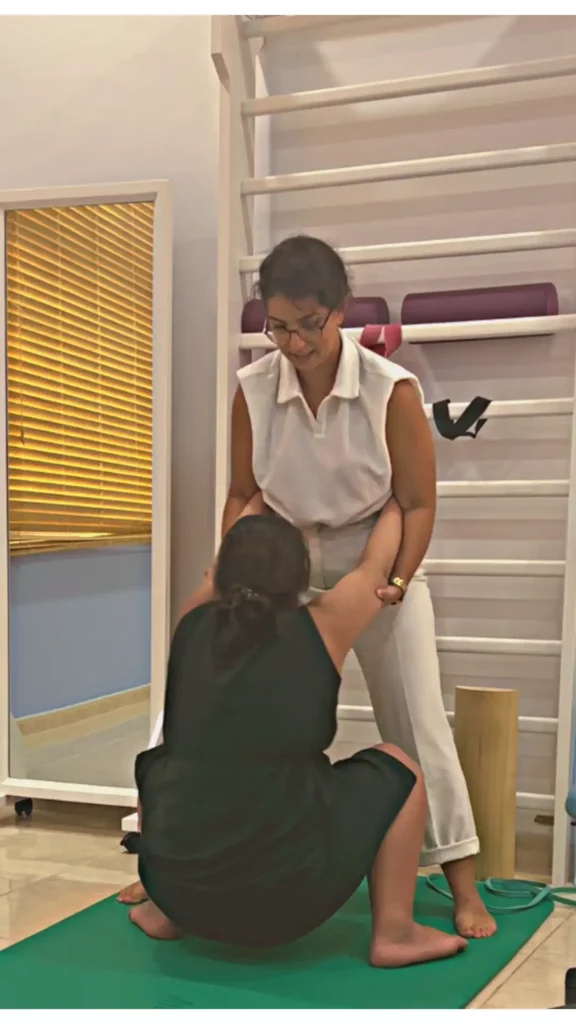
The medical name for period pain is dysmenorrhoea. This can be anything from dull achy cramps to intense pain that feels unmanageable and medication doesn’t relieve the pain easily. Menstrual pain affects the ability to relax the pelvic floor, creating more pelvic pain. This occurs as the natural tendency of the body is to create protective tension when any part hurts.
Women’s health physiotherapy improves the awareness of the pelvic floor. While learning how to work with this group of muscles you will be helping your periods to be more comfortable.
Diagnosis as Endometriosis or Adenomyosis can’t be treated by a physiotherapist. Nevertheless, exercises and manual therapy can help you to be able to deal with these debilitating conditions. A physio specialist in pelvic floor rehab will individualize your exercises and manual therapy to help you.
Read more about how to track your menstrual symptoms by clicking here.
Menopause support
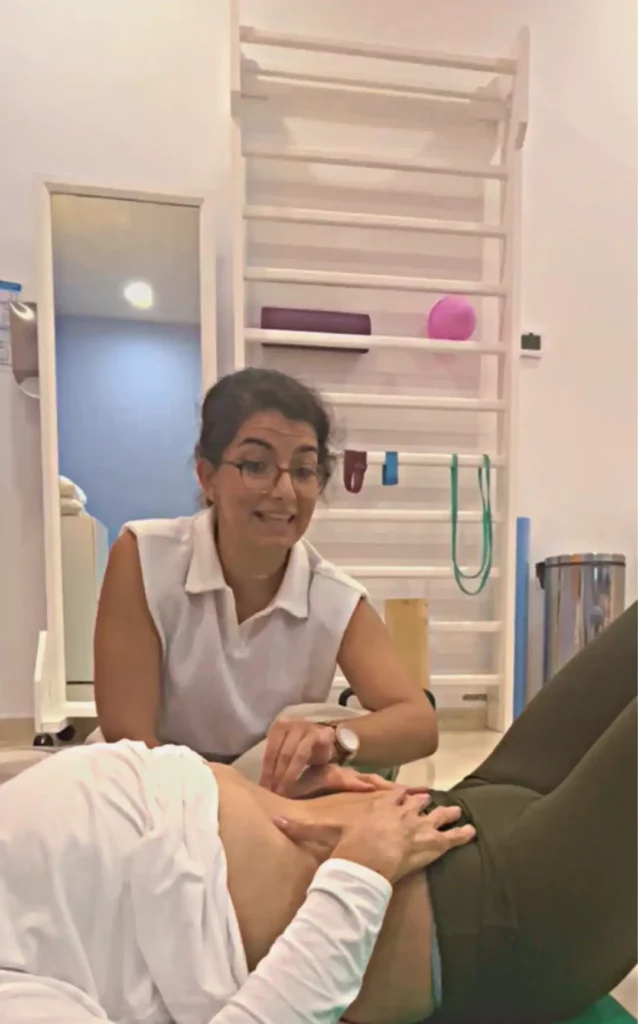
Many women struggle with climateric symptoms such as joint pain, intimacy problems, incontinence, heaviness and bloatedness. Lots of patients are recommended to stop doing their preferred physical activities. Nevertheless, exercise is one of the best ways of dealing with hormonal changes!
The hormones rule an important paper keeping the tension of our connective tissue. Basically, when the production of estrogen decreases the connective tissue becomes “loose”. That’s why we can start to suffer symptoms related to the “lack of tension” of the collagen tissue. Due to this reason, it’s important to compensate with muscle strength. The pelvic floor and the abdominal area have a high amount of fascia, meaning connective tissue.
Symptoms related to menopause, such as bloatedness, urinary incontinence and back pain happen due to the decreased quality of the connective tissue in the area.
In the past, women were recommended to avoid impact exercises. It used to be thought that impact increases the risk of osteoporosis and pelvic organ prolapse linked to menopause. Nowadays scientific evidence supports the positive effect of controlled impact exercises during menopause to increase bone density. Nevertheless, if during impact exercises you feel back pain or leaks… of course you won’t exercise!
Pelvic floor exercises will help you to prevent the descent of the bladder during exercise. Consequently, you will not have leaks practising your preferred activity. Also, while making pelvic floor rehabilitation the abdomen is engaged. Therefore you will control the episodes of back pain.
Coloproctology
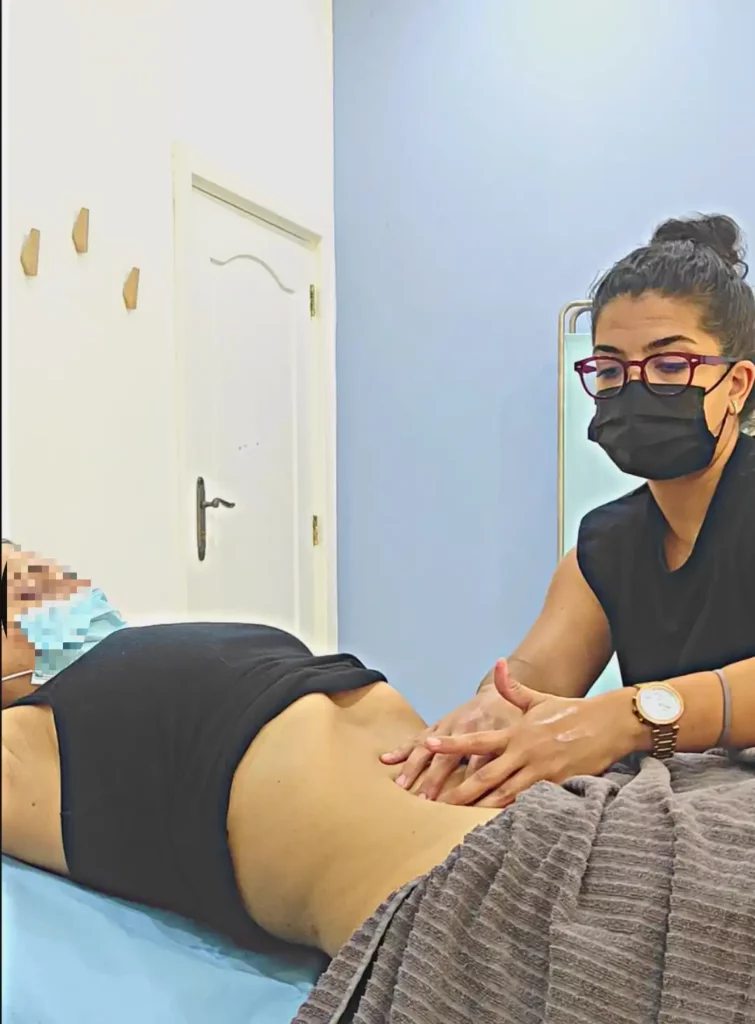
Women’s health physiotherapy includes coloproctological rehabilitation, and pelvic floor physiotherapy can help women with diverse proctological problems.
The Proctologist or Gastroenterologist doctor refer patients to pelvic floor physiotherapy sessions. The most common diagnoses are constipation, incomplete voiding, haemorrhoids and faecal incontinence. You can also book an appointment without being referred if you suspect the problem is in your pelvic floor.
During the sessions, the pelvic floor and the abdomen are assessed in order to start the reeducation. As a patient, you will receive therapy and also get homework from the first session. Constancy is very important to solve this kind of problem!
Give a read to this post about physiotherapy for constipation.